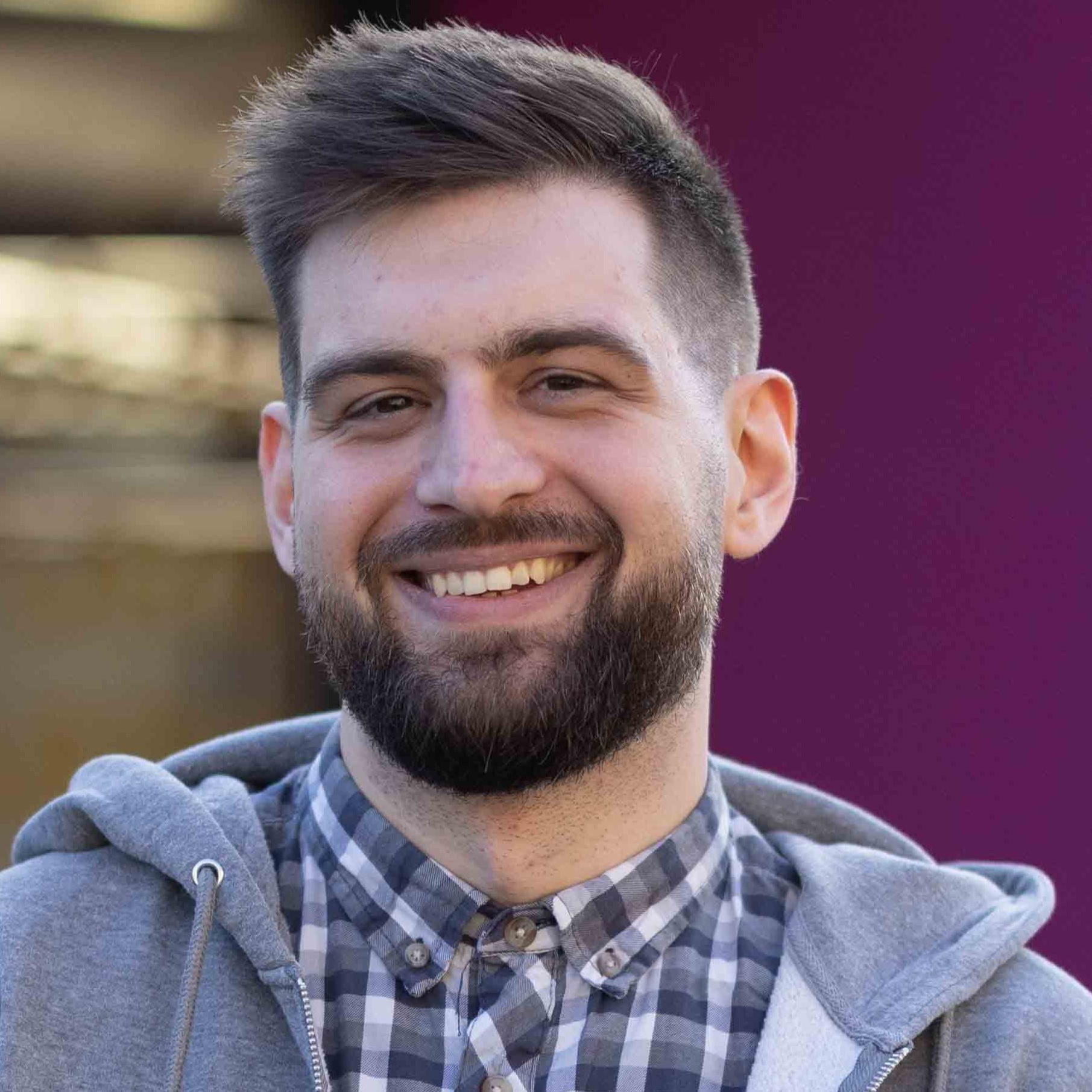
Meet the Expert: Dr Liam Satchell
Welcome to 'Meet the Expert', our news series that brings you informative interviews with Armed Forces researchers, policy makers, and service providers. Read on to learn about current work, aspirations for progress and future work, and insights into expert perspectives on key issues impacting the Armed Forces community.
 In this issue, we interviewed Dr Liam Satchell, Director of the Service Children’s Progression (SCiP) Alliance Impact Centre and Lecturer in Psychology at the University of Portsmouth. Liam is an experienced researcher, psychologist, and data analyst, with over a decade’s experience in academia and consultancy. In both his roles, he is research active in understanding effective ways to support children and young people in Armed Forces families.
In this issue, we interviewed Dr Liam Satchell, Director of the Service Children’s Progression (SCiP) Alliance Impact Centre and Lecturer in Psychology at the University of Portsmouth. Liam is an experienced researcher, psychologist, and data analyst, with over a decade’s experience in academia and consultancy. In both his roles, he is research active in understanding effective ways to support children and young people in Armed Forces families.
1. Please tell us about your background and how you came to be involved in work relating to the Armed Forces Community?
My background is in psychological research methods and data science. Most of my previous work has been in what we call ‘applied fields’ like education, security, forensics, and business-related topics. This type of work taught me a lot about bridging the typical gaps between research evidence and practice delivery. I have spent the majority of my time trying to work out the best ways to support people trying to use and generate evidence in complex and high-risk settings.
After doing some work on supporting mental well-being for school pupils, I had the chance to work with the SCiP Alliance. Since then, I have learned a lot about the diverse experiences of Service children and the organisations that support them. I have met a lot of people in the sector by working on projects with charities, teachers, policy makers, and welfare organisations, who all help Service children. Through this, I have become really invested in making sure we understand what works for Serving families.
When I had the chance to develop the Impact Centre with SCiP, where we could help organisations deliver evidence about what was really helping Service families, I was really excited to join the team and work for the Alliance directly.
2. What research projects are you currently working on, and how do they fit into the bigger picture of understanding and supporting the Armed Forces community?
The main aim of the Impact Centre is to help the sector supporting Service children to evidence their impact and their needs. A lot of the research-type work I am doing at the moment is supporting organisations with developing rigorous evaluations of their own. This way, we can try to build a ground-up evidence base of what is working in practice. It’s really exciting to have ‘flipped the lens’ in a way, and to find how research tools can be used to help those providing support to Service children and evidence their priorities.
In my academic job, I am research active on topics related to the well-being and identity of Service children. In a collaboration with Brunel University of London, University of London, Forces Children Scotland, and ACCESS, we are excited to receive funding from FiMT to investigate the changing identities and experiences of Armed Forces children and young people as their Serving parent(s) transition out of the Forces. Leaving Service has important practical impacts on Armed Forces families who may have to change where and how they live. We’re really interested in making sure we better understand the personal and practical challenges and benefits faced by families during this transition. Our hope is that the findings from this work will give useful insights that will support Veteran families and the services that work with them.
3. What other research or policy areas relating to the Armed Forces community are you especially passionate about or feel need further attention? Please expand on this and tell us about them as much as you can.
I have been part of a number of discussions about effectively supporting mobility and relocation for Armed Forces connected families. Supporting a family in moving to a new area requires a lot of change, with everything from healthcare to community and friendships needing to be rediscovered.
In particular, there is a need for support with moving schools for children and young people. In some cases, and especially when a young person might have additional needs or a disability, effective handover between schools can be quite challenging. Teachers do their best to work with young people in these situations, but it can be the case that support systems can look very different between the four Nations - and even between local areas within the countries of the UK. Not to mention further challenges with international mobilities and learning different education system cultures and processes. As a sector, we could do more to help mobility and school handovers and do so in the spirit of not overburdening teachers. It is also the case that non-Serving families may experience mobilities as well, and it is of interest for us to see what we can learn and share with the sector as well.
4. What are your future aspirations for the impact and utilisation of your work/research?
For me, I am just excited about our sector getting better use of our evidence. It sounds like a niche thing to be excited about, but the potential for better sharing and collaboration in the sector based on effective use of data is huge. Importantly, finding ways to bring everyone into conversations about what data and evidence are created and shared. Greater awareness in the Service childrens' sector of the pros and cons of different types of evidence and effective use of what we have learned could be game changing.
It's going to be great to work with anyone supporting Service children to get a better sense of what works. I’m also looking forward to working with organisations like the Centre for Evidence for the Armed Forces Community, to support accessible translation of evidence into practice.
5. What do you think are the key challenges impacting current ex-Service personnel and their families, and how do you think research and/or policy can be best used to address them?
With Service children and Armed Forces families in mind, I would probably say I’m most aware of the challenges around mobility, parental deployment, and transitioning into and out of the forces. A lot of schools and youth workers do good work connecting families and communities when there are mobilities, but there could be more done to understand and address the impacts of rebuilding a life and education in a new area. However, I’m particularly interested in the nuance of the diverse experience of Armed Forces families. Some families mention that they learn a lot from mobility, and they find advantages in the experience. For example, in some recent research the SCiP Alliance commissioned, we saw that students from Armed Forces families found their experience of mobility helped with their move to University, feeling more ready to move to somewhere new.
As a policy and research area, it is interesting to consider how we provide maximal support when there are challenges with mobility, whilst also recognising the benefits families might mention themselves.
6. What do you think will be the leading challenges for the next generation of ex-Service personnel, and how do you think research and/or policy can be best used to address them?
Something I have been thinking about a lot is the speed of modern communication. With increasingly connected families through mobile and social media, the absence of those communications will be felt strongly. What does the future look like for the experience of a family who can go between a highly accessible parent-child relationship with digital facilitation when on leave, to a delayed or non-communicative relationship while a Serving parent is in a no-comms zone for a long time? This has always been a challenge, and it is something I have heard when speaking to parents already. However, if we are looking to the future, there will only be stronger digital connections between families, so perhaps their absence will be felt more strongly. We need to consider what digital education or contextualisation families might have (and not just Serving families, I suppose!) to support these communcation absences.
7. Can you tell us about the methods you tend to use in your research, and why you gravitate towards these kinds of approaches?
As I have typically focused on larger datasets, my research tends to make use of quantitative methods, with psychometric tools, observations, and behavioural data. I am increasingly using methods which look at ways of summarising large open response data, where we might bridge the gaps between personal experience and large samples (such as content analysis and machine learning informed approaches). From an applied methods perspective, I tend to prefer observations of things happening in practice and trials. Still, I have also conducted some research where we conduct experiments to understand more fundamental behaviours.
8. Given unlimited funding and time, what would be your dream piece of research to undertake involving the Armed Forces community?
I think we would benefit greatly from more whole-family longitudinal research. What happens to all members of a family when someone joins the Forces? How does the family experience Service life, and how does the transition out of Service affect all family members? Research like this is expensive, time-consuming, and practically difficult (reaching families and Serving people). But work like this might become necessary in time, as we can look at our current knowledge base and have a number of questions that need to be well addressed. Whole family research would be the method here, as for example, our knowledge of the Serving person’s perspective on their family’s experience is not well understood. We also might need longitudinal methods, where we follow a family for a time, to know what factors are protective or helpful for mobility and transitioning out of the Forces. A big dream, but we could learn a lot more!
Many thanks to Dr Liam Satchell for sharing his insights.
Catch us next month for another interesting and informative interview with an expert from the Armed Forces community.